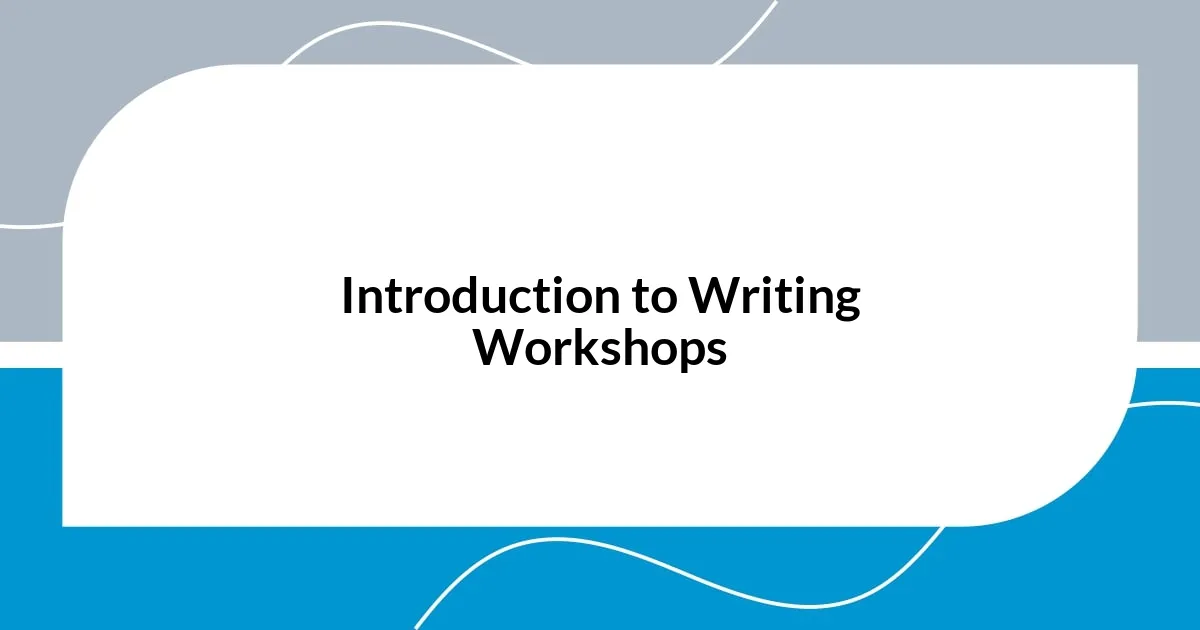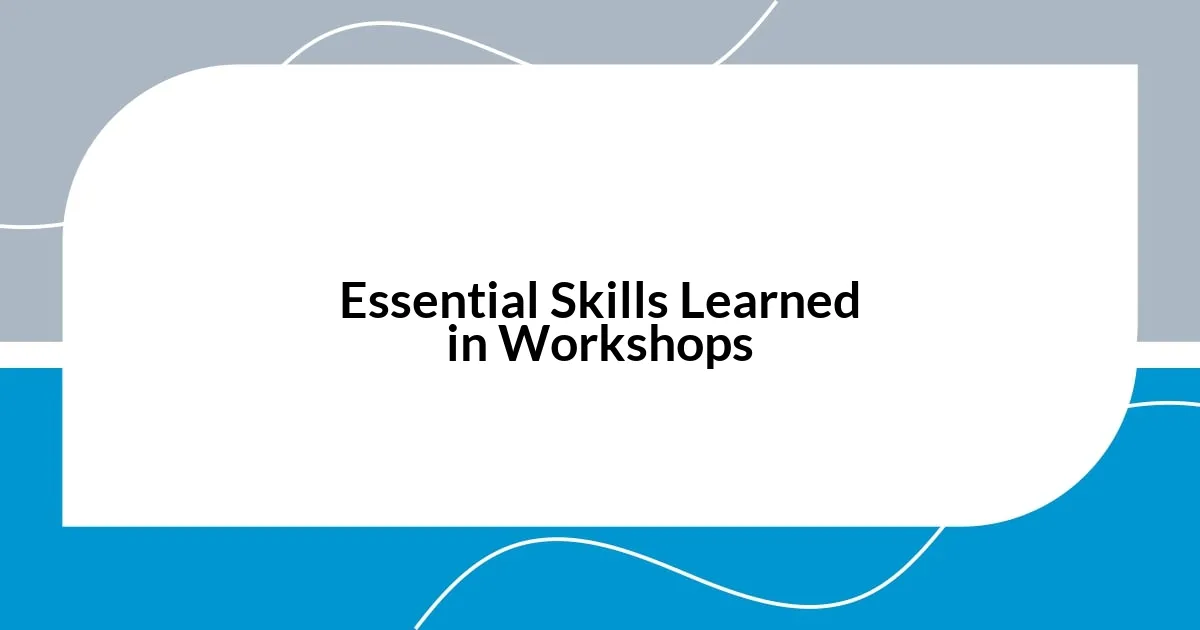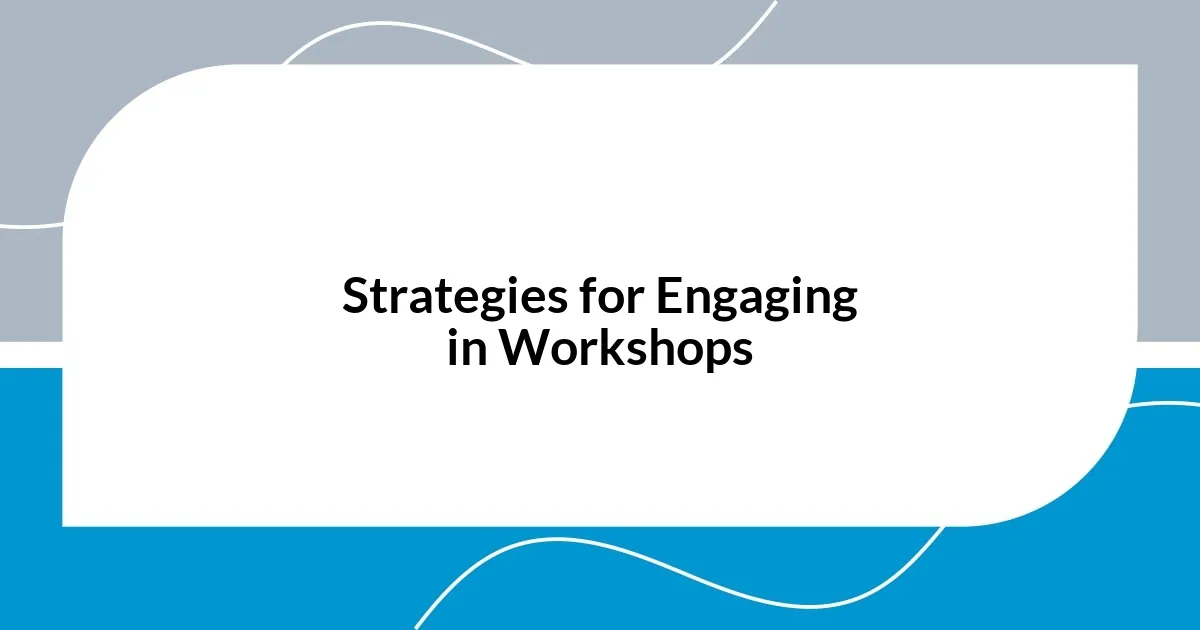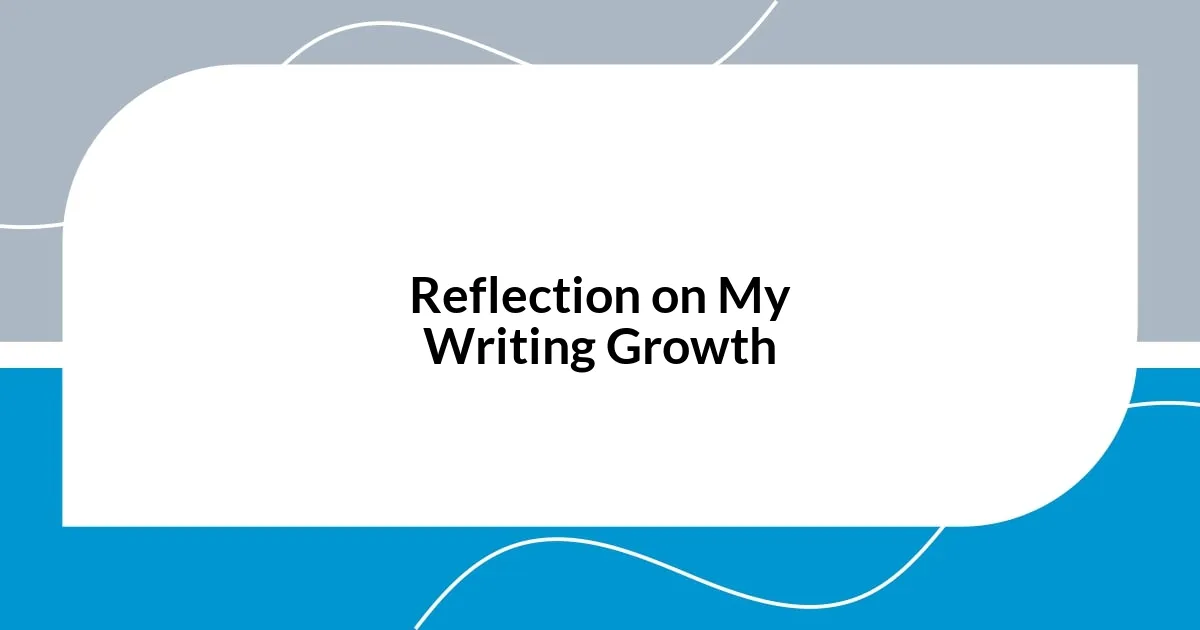Key takeaways:
- Writing workshops foster community and collaboration, helping writers overcome self-doubt through supportive feedback and shared experiences.
- Constructive critique in workshops improves writing skills, while vulnerability and honesty deepen connections with readers.
- Choosing the right workshop tailored to personal goals enhances the learning experience and promotes a sense of belonging.
- Networking opportunities within workshops can lead to mentorships, collaborations, and broader audiences for writers.

Introduction to Writing Workshops
Writing workshops are transformative spaces where creativity blossoms. When I first stepped into my first workshop, I was nervous, unsure if my writing could stand up to the critique of others. Have you ever felt that twinge of self-doubt when sharing your work? I certainly did, but those initial jitters quickly faded as I began to see the power of community and collaboration.
In a writing workshop, you’re not just a solo writer grappling with your words; you’re part of a vibrant tapestry of voices. The feedback you receive can sometimes sting, but it’s ultimately a gift that sharpens your skills. I remember one session where a fellow participant pointed out a recurring phrase in my poetry. At first, I was defensive, but after some reflection, I realized how much clearer and stronger my writing became once I embraced that insight.
These workshops teach you invaluable lessons, not just about writing but about vulnerability and resilience. They challenge you to expose your thoughts and emotions in ways you may not have before. Isn’t it fascinating how sharing your work with others can open doors to deeper self-exploration? Personally, each workshop I attended left me feeling more equipped to convey my stories with authenticity and depth.

Reasons to Join Writing Workshops
Writing workshops offer a unique opportunity to grow as a writer through constructive feedback. I vividly recall a moment from a workshop where I had just shared a short story I was deeply proud of. When the feedback came, I initially felt a sinking feeling in my stomach, but as the discussion unfolded, I realized that those insights pushed me to see my work from fresh perspectives. It’s almost like having a personal coach, guiding you toward improvement and encouraging you to refine your craft.
Another compelling reason to join a writing workshop is the sense of community it fosters. You’re surrounded by people who share your passion and understand the struggles that come with writing. There was a sense of camaraderie during a group discussion on overcoming writer’s block—everybody had their own stories and strategies. Connecting over those challenges can be incredibly validating. It’s reassuring to know that you’re not alone in this journey, and sometimes, the friendships I’ve formed have been just as valuable as the skills I’ve gained.
Lastly, workshops encourage experimentation. They challenge you to step out of your comfort zone and explore styles and genres that you might not ordinarily pursue. During one session, I was prompted to write a piece in a form I had never tried before, which led to a creative breakthrough for me. That willingness to explore—and the support from others—can lead to delightful surprises in your writing journey. Why not take that leap? You might discover new facets of your creativity that you never knew existed.
| Reason | Benefit |
|---|---|
| Constructive Feedback | Improves writing through fresh perspectives |
| Sense of Community | Builds relationships and offers emotional support |
| Encouragement to Experiment | Fosters creativity and opens up different writing styles |

Choosing the Right Writing Workshop
Choosing the right writing workshop is crucial for maximizing your experience and growth as a writer. I remember when I first started exploring workshops, I felt overwhelmed by the options available. Each had its unique flavor, focus, and atmosphere. It’s important to think about what you want to achieve. If you’re seeking nurturing feedback, look for a workshop that emphasizes supportive critiques. On the other hand, if you’re ready to challenge yourself, you might prefer one that encourages bold experimentation.
Here are some key aspects to consider when choosing a writing workshop:
- Focus: Does the workshop cater to the genre you want to write in, such as poetry, fiction, or memoir?
- Instructor’s Background: What is the instructor’s experience? Their expertise can greatly influence your learning experience.
- Size of the Group: Smaller groups often allow for more personalized feedback, while larger ones can provide diverse perspectives.
- Atmosphere: Is it a warm, inviting space, or is the environment more competitive? Choose what aligns with your comfort level.
- Schedule and Format: Consider if a weekend retreat or a weekly evening session fits better with your lifestyle.
Reflecting on these factors will guide you toward a workshop that resonates with your writing goals and personal style. I distinctly recall a workshop that felt just right for me; the camaraderie among participants made me feel instantly welcomed. It was a cozy space where sharing felt less daunting and more like a collective journey, solidifying my belief that the right environment can transform your writing experience.

Essential Skills Learned in Workshops
One essential skill I gained from writing workshops is the art of constructive critique. I remember a particularly impactful session when a fellow writer bravely opened her work for discussion. The group didn’t just point out flaws; instead, we engaged in a respectful dialogue that allowed her to see the strengths in her piece alongside areas for improvement. This experience taught me how to give and receive feedback effectively, shaping my writing into something more polished and thoughtful.
Another skill that blossomed was the ability to write with vulnerability. I had always hesitated to share deeply personal stories, fearing judgment. However, during a workshop focused on memoir writing, I was inspired by others who wore their hearts on their sleeves. Seeing them share, I felt a nudge to do the same. It was liberating to express myself authentically, and I realized that honesty often resonates more with readers than polished perfection.
Lastly, I can’t underestimate the importance of building a writing routine. Prior to attending workshops, I would write sporadically, often feeling lost between projects. A workshop I participated in included discussions around establishing habits, and I decided to implement a daily writing ritual. This consistency not only boosted my productivity but also helped solidify my identity as a writer. Have you ever considered how a structured routine could elevate your writing practice? I can attest that turning writing into a non-negotiable part of my day transformed my approach and output immensely.

Strategies for Engaging in Workshops
Engaging actively in workshops is crucial for making the most of the experience. I’ve found that asking questions can be a game changer. During one session, I felt hesitant to speak up, but when I finally raised my hand to ask about a particular point in an exercise, it opened the door for deeper discussion and clarification not just for me, but for others too. Have you ever been in a similar situation where curiosity transformed the conversation?
Another effective strategy is to share your work ahead of time. I remember exchanging pieces via email before a workshop, which allowed everyone some time to reflect and formulate their responses. The quality of feedback was richer because we all had the chance to digest the work deeply, turning our critique sessions into meaningful dialogues rather than quick remarks. It fosters a sense of community and dedication among participants, making each session more engaging.
Lastly, actively participating in group feedback sessions has profound benefits. I recall a workshop where we took turns reading our pieces aloud and then collectively discussed each one. Hearing others share their perspectives helped me not just listen to suggestions, but also learn from how different people interpret writing. What an eye-opening moment it was! This shared vulnerability encourages a culture of support, and the insights gained from varied interpretations can enrich your own writing journey significantly.

Benefits of Networking in Workshops
Workshops offer a unique opportunity to network with fellow writers, and I simply can’t overstate how beneficial these connections can be. During a particularly memorable workshop, I struck up a conversation with a writer who specialized in fantasy fiction. We exchanged contact information, and within weeks, not only did I have a trusted critique partner, but I also found a mentor who guided me through my own world-building struggles. Isn’t it fascinating how a simple chat can open doors to new learning possibilities?
Building relationships in workshops isn’t just about finding feedback; it’s about creating a supportive community. I remember feeling isolated in my writing journey until I joined a workshop where participants shared not only their work but also their challenges. A sense of camaraderie developed as we celebrated each other’s successes, attended readings together, and exchanged encouragement during tough writing phases. Have you ever leaned on a community like that? I can assure you, lifting others can elevate your own craft too.
On another occasion, I attended a workshop where one of the participants had self-published a collection of short stories. After a lively discussion about her process, she graciously offered to collaborate on a local reading event. This not only led to our shared project but also expanded my audience significantly. Networking in workshops can be a catalyst for opportunities you might never have considered otherwise. How might your writing journey change if you embraced the connections around you?

Reflection on My Writing Growth
Reflection on my writing growth has become a journey of self-discovery and empowerment. I recall standing at the edge of a workshop, feeling like a novice, almost intimidated by the talent surrounding me. But every time I shared a piece of my work, it felt like peeling back layers of self-doubt. With each reading, I grew bolder; the supportive feedback lifted me in ways I hadn’t anticipated, reinforcing that my voice mattered.
There was a moment, during a particularly challenging session, when I wrote my first truly personal story. I hesitated to share it, fearing the vulnerability it entailed. But when I did, the room seemed to resonate with my words. I remember glancing around and seeing nods of understanding, smiles of encouragement. That experience solidified my belief that writing is not just about crafting beautiful sentences; it’s about connecting with others on a deeper level. Have you ever felt that rush of courage, sharing something so intimate that it transformed your perception of yourself as a writer?
What’s truly fascinating is how these workshops encouraged my evolution from a passive participant to a proactive contributor. One time, I took the initiative to lead a discussion on narrative structure. Although initially apprehensive, I found a satisfaction in guiding others while simultaneously affirming my own knowledge. This role reversal not only enhanced my confidence but also deepened my understanding of storytelling principles. I’ve come to realize that sharing knowledge can be just as transformative as receiving it. How has stepping into a teaching or leadership role shifted your perspective on your own skills?